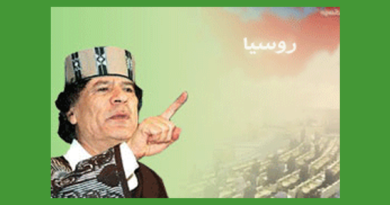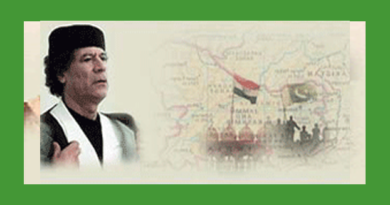The Illegality of the ICC
The Illegality of the International Criminal Courts and Tribunals
The international courts and tribunals are a feature of an international system that is based on selectivity and double standards. What these courts have in common is their lack of the legal conditions for the existence of any court.
The conditions for the legality of any court are well-known. It must by established by a legitimate authority, whose legitimacy is derived from a legal status. The events brought before it must constitute clearly defined offences established in a previous law that precedes their commission. The punishments for such acts must also be established in that law. The law must be enacted by a legitimate legislative authority. The judges of the court must enjoy full independence and the ability to make their rulings free from any outside influence. The rules of procedure of the court must ensure due process for the defendants. Do the international criminal courts and tribunals meet these conditions? The answer is, No!!
In fact, the international criminal courts that the world has known were established in one of two ways. They were either established by the victors of a certain war, as was the case with the military tribunals of Nuremberg and Tokyo that were created by the victorious Allies after World War II, or by an “international” authority of dubious legitimacy as was the case with the International Tribunals for the Former Yugoslavia and Rwanda that were created by the Security Council.
In establishing the tribunals of Nuremberg and Tokyo in the wake of World War II, the Allies invoked only the legitimacy of the victors who were capable of imposing their terms on the vanquished. They created those tribunals in a manner that guarantees the condemnation of their enemies as criminals while absolving them of their own war crimes. Foremost among those crimes was the annihilation of hundreds of thousands of civilians by the use of a weapon that exceeded the needs of deterring the enemy namely; the atomic bomb. Those tribunals met none of the standards of justice in view of the following facts:
-
They were created by the political leaders and military commanders of the occupation forces. Their judges were not impartial. They were themselves the opponents on the field of battle. In accordance with the recognized standards of justice, they were not qualified to play the role of a judge since they were party to the conflict.
-
The defendants before those tribunals were prisoners of war. Under international law, they could not be brought to trial.
-
The acts for which the defendants were tried were not crimes defined in, and established by a previous law as justice requires. The list of “crimes” was established by the victorious Allies Ex Post Facto (after they were committed). This is in violation of the principle of legality of crimes and punishments. It also violates the principle of the non-retroactivity of the law.
-
The Tokyo tribunal was created by a special order of General McArthur. That personal order established new, contrived crimes and offences that existed only in McArthur’s imagination. Needless to say, the court under that law victimized many defenseless Japanese.
-
The definition of the “crimes” of the defendants, if they can be described as crimes, was and continues to be the subject of disagreement among the countries of the world.
-
The rulings of those tribunals were based on mere suspicion and doubts, not on proof and evidence. For instance, the Tokyo Tribunal condemned a Japanese commander for what it considered the crimes of the soldiers under his command in the Philippines. He was sentenced to death despite the fact that it was not proven that he had given any orders. Indeed, he could not have known what had happened for the simple reason that he had fled the battlefield.
Those tribunals were a sham whose only purpose was to provide justification for the conduct of the Allies who exceeded the legitimate right to self-defense. A proof of this is that unlike the other Allies, Russia, the country most devastated by the War, did not put any of the German military commanders in the part of Germany it occupied, on trial.
The international criminal courts are illegal. So are their sentences. Their victims and their relatives are entitled to just restitution and reparations for the injustice visited upon them. They are entitled to demand rehabilitation. The events of World War II must be brought once again before impartial courts that would reconsider the conduct of the victors and the vanquished alike. The earlier tribunals did not prosecute the crimes committed by both parties. They were confined to the prosecution of the vanquished alone. More importantly, the crimes for which they were tried had not been established in a previous law. Therefore, those tribunals violate the legal rule “Nullum crimen, nulla poena sine lege”. (No persecution for a crime unless pursuant to a previous law establishing that crime).
The same applies to the International Criminal Tribunals for the Former Yugoslavia and Rwanda. They were both established by the Security Council. The legitimacy of the Council is dubious. It was created in the same manner, and under the same circumstances, in which the Nuremberg and Tokyo Tribunals were established. It is yet another one of the products of World War II. The victors created the Security Council as a tool to shape international relations in the manner they saw fit. It was not created by the independent will and free choice of the states of the world. In addition, the Security enforces the law, it has no right to enact it. Laws are enacted by the legislators elected by the people. The character of the council and the tasks it currently discharges are dubious because it represents only a minority. The states of the world did not take part in its creation. Therefore, it has no right to put their citizens on trial. Suffice it to recall that the International Court of Justice ruled that the Security Council had no jurisdiction over the Lockerbie question. Nevertheless, the council disregarded that ruling and continued to address the Lockerbie question without any international legal basis. At the same time, the Council did not address the Court’s ruling concerning the “Military and Paramilitary Activities in and against Nicaragua”.
The so-called Security Council has absolutely no legal right to establish courts or tribunals. Article 29 of the Charter cannot be construed as giving a right to establish courts. It only authorizes the establishment of subsidiary organs. The misuse by the Council of that and other provisions is a gross infringement upon the sovereignty of peoples.
Therefore, the resolutions of the so-called Security Council pertaining to the establishment of courts and tribunals are null and void under international law and jurisprudence.
The current international courts and tribunals were created in the fashion of their antecedents. Their purpose is not to try all those who may have committed a crime, but to try the weaker, vanquished party alone.
In creating the two above-mentioned tribunals, the Council acted under Chapter VII of the Charter. This is yet another proof of their politicized character and lack of impartiality.
The Sierra Leone tribunal is also illegal. Even if it was established on the basis of a request from the government of Sierra Leone, this does not give it the necessary legal conditions for a lawful court. It falls outside the national judicial system of Sierra Leone. Its statute and rulings are not subject to the supervision of that system for the following reasons:
-
The Statute of that Tribunal is shaped in part on the basis of the so-called principles of international law derived from the statute and the rulings of another illegal court; that of Nuremburg.
-
The president and prosecutor-general of the Tribunal are not from Sierra Leone.
-
Among its judges, there are foreign nationals who are not subject to the national sovereignty of which the judicial system is an integral part.
-
The sentences passed by the Tribunal will be implemented outside Sierra Leone.
The International Criminal Court (ICC)
The establishment of the ICC followed the same lines of the Military and Ad-Hoc International Criminal Tribunals. Although established by a treaty, its Statute was based on the rules governing the above-mentioned international tribunals and on the rules of the Nuremburg Trials. This inherent distortion has stripped it of its character as a court of law in the strict legal sense. This is evident in the following:
-
The Statute of the ICC allows the Security Council to request it to halt the proceedings of any case brought before it. Even if the Council abandons it’s well-known selectivity and double-standards in dealing with international peace and security, any relationship whatsoever it may have with the Court negates the independence of the ICC and strips it of its character as a court. This is borne out by the fact that the Council exercised its “tutelage” over the Court even before it started its work by adopting Resolution 1422 which constitutes a flagrant violation of the principle of the independence of the judiciary.
-
Thus far, the Court does not have a unanimously-agreed international legal text that establishes the offences prosecutable by it or the punishment for such offences. The absence of this text renders the establishment of the Court on the basis of the principle of the non-retroactivity of the law and the principle of legality “Nullum crimen, nulla poena sine lege”, as contained in its Statute, devoid of any practical value.
-
The jurisdiction of the Court does not cover the crime of aggression!! That crime is the basis and the cause of all the other crimes covered by the jurisdiction of the ICC!!
-
The Rome Statute mentions the most grievous crimes while it ignores the lesser ones. This is a grave imbalance in the Statute. That imbalance came into being upon the orders of certain states.
-
The Court lacks the most basic guarantee of justice; namely, the right of defendants to legal defense. In that, it is no different from other international criminal courts and tribunals where the matter of defense is a mere formality. Neither the tribunals nor the Court have specific machinery for legal defense that assures defendants of a fair trial. Indeed, the draft code of professional conduct for lawyers and the standards and procedures for the provision of legal assistance was recently adopted to satisfy a formalistic requirement so that the Court, if it can be called a court, could start its work. It was adopted without a study to ascertain its adequacy in ensuring one of the most basic rights of the defendants.
-
The court will be no exception to the method of work of other international courts and tribunals. Like them, it will base its verdicts and sentences on suspicions, doubts and circumstantial evidence. It will not be obliged to build its rulings on conclusive legal evidence. The Court was modeled after the International Criminal Tribunal for the Former Yugoslavia. That tribunal condemned the commanders of the Bosnian Serb Army and the Bosnian Croat Army without any evidence that they had given orders to commit the crimes of murder and torture for which they were condemned. Indeed, it was not proven that either of them was even in the theater of operations at the time of the commission of those crimes.
-
The Court fails to meet the requirements of justice concerning the multi-tier litigation. The fact that the Court is divided into various divisions (Pre-Trial, Trial and Appeals) cannot be considered as the multi tiers that must be available in any judicial system. The reason is that those Divisions are confined to the 18 judges of the Court who are selected by the Assembly of the States Parties. It is the judges who assign themselves to its various divisions. They select the Presidency of the Court from among themselves. It is they who determine the Chambers, their distribution and the assignment of judges thereto. They also adopt the rules of the discharge of the tasks of the Court. This makes it more like an administrative body than a court. It falls short of the level of any national court. The shortcomings of the Court, which strip it of its legal character as a court, are further compounded by the absence of an independent cassation authority where the rulings of its Appeals Division can be challenged. In any national judicial system, there exist courts of cassation and supreme courts to which defendants can resort to challenge the sentences passed against them by the lower tiers of litigation.
In addition to the above-mentioned, a court that is subject to the influence of an international authority of dubious legitimacy such as the Security Council and that of the major powers cannot be a fair court. Even if it were established by the General Assembly of the UN, it would still lack legitimacy and legality. The General Assembly is made up of civil servants who represent their countries before the UN. They are not legislators. They have no right to legislate. The General Assembly of the UN deals with the political and diplomatic questions facing the world. It is not empowered to legislate or enact laws. Legislation is the exclusive right of the world’s parliaments or their representatives. An international court can be legitimate only if parliamentary representatives gather in a general assembly and adopt a statute or a basic law for such court.
The international criminal courts and tribunals that the world has so far known remain a mere façade. Rather than promoting justice, they distort it for the following reasons:
-
Thus far, there is no unanimously-agreed international legal text that establishes the prosecutable offences or the punishment for such offences. The absence of such text makes it difficult to conclude that the international criminal law is an established one based on the principle of legality “Nullum crimen, nulla poena sine lege”, even if those rules are codified in international instruments starting with The Hague Convention of 1899 and subsequent international conventions and treaties.
-
The states of the world have yet to agree on a precise definition of the crime of aggression that would facilitate the determination of aggressors and those who exercise the legitimate right to self-defense. In addition, the concept of aggressive war remains ambiguous.
-
Invoking the General Assembly resolution of November 1946 that codified the rules of international law derived from the Statute and rulings of the Nuremburg Court, is illegal. The resolution was based on an illegal premise because the Nuremburg Court itself is illegal. By codifying the rules of international law derived from the Statute and rulings of the Nuremburg Court, the resolution has corrupted international law.
Despite its lack of legitimacy, and despite its nature as an “emergency” council, the Security Council continues to have the upper hand in shaping relations among states. Therefore, the ICC will remain, like its creator, an “emergency” court. It will also remain a façade that hides the ill intentions of the powerful states towards the weak ones. It will enable the powerful states to escape the authority of the court, if it can be said to have any real authority. National courts will continue to be more credible than the international ones. Thanks to their legitimacy and independence, the public will continue to consider the sentences of national courts as fair and impartial. The principle of universal jurisdiction of national courts allows any state to bring the perpetrators of war crimes to justice before its courts, regardless of where those crimes were committed and regardless of the nationality of their perpetrators.
International law has not matured yet. It is still of a customary nature that does not enjoy the unanimity of the world. However it develops, it will continue to be a law “among” states, not “above” them. National sovereignty of states over their territory and citizens remains the criterion for the interpretation and application of any international instrument.
As a general rule, people have a natural right not to be subject to a law in whose formulation they did not participate. They must never be forced to follow a law enacted by any authority without their willing participation.




